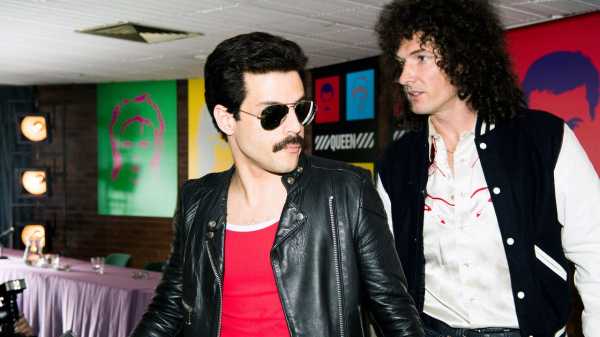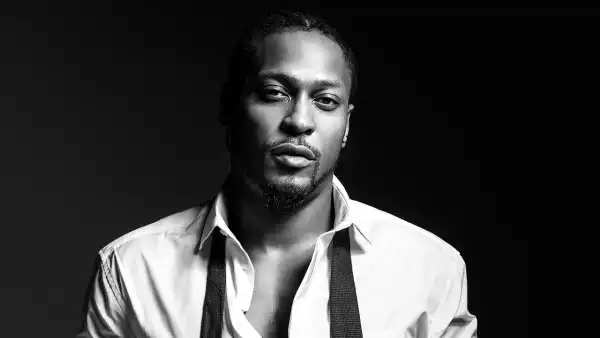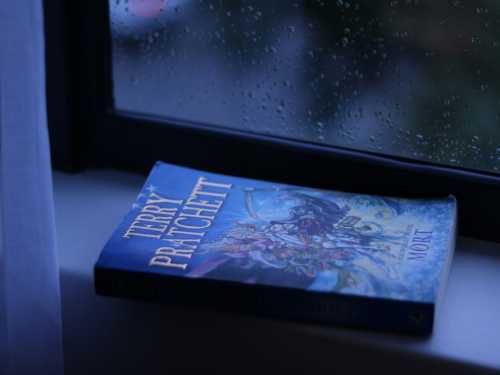
It may be that the only way to experience a full measure of Queen nostalgia is not to have heard the band the first time around—to indulge in vicarious nostalgia, a homecoming to somebody else’s home. If so, “Bohemian Rhapsody,” a superficially clichéd yet thematically unusual bio-pic about the band’s lead singer and guiding spirit, Freddie Mercury (Rami Malek), delivers that secondhand rock memory by rooting its story less in the primary experience of the band’s performances than in a subtly revisionist, sharply current view of Mercury’s life and work. The movie has been criticized for its lack of attention to the specifics of his sex life. In fact, it is clear about Mercury’s sexual orientation. (In the movie, Freddie—as we’ll call the character, to distinguish him from the historical Mercury—states that he’s bisexual and is shown to be in two long-term relationships with men, though it only hints at any casual ones.) But “Bohemian Rhapsody” isn’t a comprehensive bio-pic, nor a full-spectrum consideration of Mercury’s life—it is a clearly and carefully oriented vision of his career. It’s mostly interested in his private life in relation to a single big idea: success and its price.
“Bohemian Rhapsody” offers nothing of Mercury’s childhood in Zanzibar, his schooling in Bombay, his lifelong devotion to rock and roll. The movie shows no years of dedicated practice or earlier musical life or ambition; his sole primordial effort is a song that he scribbles on a piece of paper and keeps folded up in his pocket while working, as a young man in London, as an airport baggage handler. Mercury, who played piano and guitar, is of course depicted as being possessed of a formidable vocal technique, a remarkable near-operatic voice—but it’s presented as a natural gift that’s also a curse. He was born, as Freddie says, with four extra incisors, and the larger oral chamber is the reason for his large vocal range. Freddie first shows off that range in a parking lot outside a club, where he’s trying to get members of a local band to take one of his songs. But the band has just lost its lead singer, and so Freddie does a spontaneous audition for them—not, however, before they make fun of his facial deformity and suggest that it’s an insurmountable obstacle to his becoming a band member, let alone its front man.
A protruding mouth isn’t the only trait for which Freddie endures insults. Born Farrokh Bulsara, he’s an ethnic Parsi, a descendant of the Zoroastrians who fled Persia for India more than a millennium ago; in Great Britain, he’s frequently insulted as a “Paki.” (At his airport job, he meekly replies that he’s not from Pakistan.) He’s also a bisexual man in a country that had only recently decriminalized homosexuality, at a time when it was widely considered shameful, or at least indecent. And he’s from a poor family whose struggles he relates to discrimination. In one of the movie’s exemplary scenes, Freddie is at home with his parents, planning an escape into music (and declaring that his name is no longer his given one of Farrokh but, rather, Freddie); his father instead preaches to him a credo, exhorting him to pursue “good thoughts, good words, good deeds.” Freddie’s retort isn’t a variation on “boring”—it’s, “And how has that worked out for you?” His father’s virtuous modesty hasn’t brought success in the face of prejudice; Freddie’s bold self-assertion is meant to do so.
When the band’s music begins to crystallize, Freddie masterminds its path to success. He decides that the band should sell its van to finance the recording of an album, and, in the studio, he orchestrates its production as well as the unusual studio techniques with which they create it. He gives the band the new name of Queen; he arranges the crucial meeting, with Elton John’s manager (Aidan Gillen), that will put the band on the map; and, at that meeting, he sells the manager on the band’s future hit-making successes. The scene offers Freddie one of the script’s great arias, on the subject of his ambitions, as he tells the businessman that he’s playing “for the outcasts in the back” because those are the people with whom he himself identifies.
The direction of the film (credited to Bryan Singer, who was fired late in the production and replaced by Dexter Fletcher but is granted sole credit) is often oddly denatured, flip, and incurious, and its lack of vision keeps the movie far short of its—and, above all, of Malek’s—finest inspirations. (The filming of Malek’s onstage performances as Freddie, which are chopped to bits and reduced to cliché-riddled snippets, is particularly insensitive.) But at its best the film is spare and clarifying, and ideologically unambiguous: its strength is in the positioning of Mercury as an artist who confronts opposition throughout society—including from the very institutions that he needs in order to succeed. The script offers Freddies another great aria to deliver, to a record-company executive (played by Mike Myers), in which he declares his ambition to make music with the power of opera, “the wit of Shakespeare, the unbridled joy of musical theatre,” intending to offer “something for everyone.” “We’ll speak in tongues if we want to,” he says. The song “Bohemian Rhapsody,” which the record company hesitated to record and then wouldn’t issue as a single, of course became a hit, at which point the movie offers a remarkable montage featuring quotes from reviews of the song, all negative. The very source of Freddie’s popularity—his keen insight into the humiliations and the frustrations of listeners, their strivings and their dreams, their search for love and visions of stifled grandeur—made him rich, famous, and artistically fulfilled, but critically derided.
For that matter, it’s only in those moments of performance, of communion with people who, each in their own way, share his sense of oppression and humiliation, that Freddie feels himself to be truly himself. His joy in performance is a joy in solidarity, and his life offstage can hardly match it. (He speaks of his partying life as a quest for distraction from the “in-between moments” when “the darkness comes back in” and, later, explains his drug use: “Being human is a condition that requires a little anesthesia.”) Yet for his success he’s not just beloved—he’s also subjected to the aggressive prying of gossip-mongers and paparazzi, the brickbats of critics, and the betrayal of intimates. And then he discovers that he’s sick; he’s diagnosed with AIDS; he realizes that he’s dying.
More than most bio-pics (more than most movies), “Bohemian Rhapsody” is carried by the performance of its lead actor, because Malek offers more than a skillful impersonation—he offers an imaginative interpretation. Malek does an impressive job of re-creating Mercury’s moves onstage, but the core of the performance is Malek’s intensely thoughtful, insight-rich channelling of Mercury’s hurt, his alienation and isolation even at the height of his fame. While watching the movie, I found his performance eerily reminiscent, as if based less on Freddie Mercury himself than on some other movie actor’s performance. Then it struck me: Malek wasn’t just channelling hurt; he was channelling Hurt—Malek’s quiet and nearly abashed delivery of lines, in a way that emphasizes both Freddie’s extra teeth and the emotional effect of being singled out for them, reminded me of John Hurt’s performance as John Merrick, in David Lynch’s “The Elephant Man.”
Still, for all its pain, the movie is about the virtue and the quality that inhere in success. It displays rock music as the one place where a total outsider such as Mercury could completely belong. The movie “Bohemian Rhapsody” evokes a Warholian concept of success, of commercial and mainstream success as a personal statement, a mode of artistic expression. Criticize the music’s simplistic emotions, earworm hooks, instant clichés, and crowd-pleasing exhortations as much as you’d like, the movie suggests, but don’t misunderstand it as insincere or inartistic, as selling out or pandering. Freddie, as depicted, aims at commerce with a dead-set sense of purpose and principle.
What’s more, Freddie’s work is, in the movie’s view, as sincere in its synthetic aspects as it is in its plain ones. In this regard, “Bohemian Rhapsody” is also a virtual rebuke to the veneration of the singer-songwriter as seen in Bradley Cooper’s version of “A Star Is Born” (which regrettably dismisses the very kind of persona-crafting that is central to Lady Gaga’s own art). Freddie is certainly both a songwriter and a singer, but he’s also a persona from the start, whose elaborately crafted masquerades are as central to his creative personality as is his vocal and instrumental self-presentation. (Whether Mercury’s work matches a Warholian originality of artistic form is debatable, though the movie comes down strongly in favor, as in the episodic oddity of the song “Bohemian Rhapsody.”)
The movie “Bohemian Rhapsody” makes the case that Mercury is more interesting than his music—and, by extension, that popularity itself, the ability to become a mainstream star and hitmaker, is itself no fluke or by-product but a conscious creation and a mark of genius. The movie’s vision of Mercury’s life embodies a phrase by Stendhal cited by Nietzsche in “Beyond Good and Evil”: “A banker who has made a fortune has a part of the character that’s needed to make discoveries in philosophy, that is, to see clearly into what is.” Freddie, the movie suggests, wrote, sang, produced, and performed, from his constrained and petty life, from his multiple public and private oppressions and humiliations, all the way to the bank.
Sourse: newyorker.com






